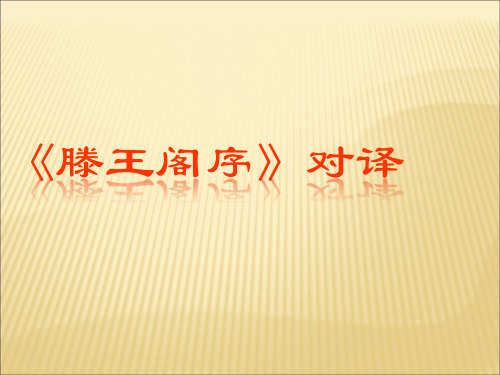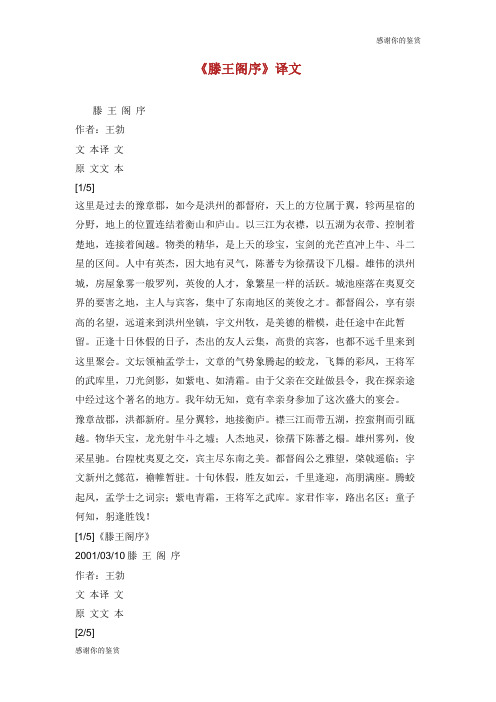滕王阁记 罗经国先生翻译
- 格式:doc
- 大小:64.50 KB
- 文档页数:6

《滕王阁序》原文与译文对照《滕王阁序》原文与译文对照呵! 名胜之地不能常存,盛大的宴会难以再逢,兰亭宴集已为陈迹,石崇的梓泽也变成了废墟。
让我临别时作了这一篇序文,承蒙这个宴会的恩赐,至于登高作赋,这只有指望在座诸公了。
我只是冒昧地尽我微薄的心意,作了短短的引言。
在座诸位都按各自分到的韵字赋诗,我已写成了四韵八句。
在座诸位施展潘岳,施展陆机一样的才笔,各自谱写瑰丽的诗篇吧:滕王高阁临江渚,佩玉鸣鸾罢歌舞。
巍峨高耸的滕王阁俯临着江心的沙洲,想当初佩玉、鸾铃鸣响的豪华歌舞已经停止了。
画栋朝飞南浦云,珠帘暮卷西山雨。
早晨,画栋飞上了南浦的云,黄昏,珠帘卷入了西山的雨。
闲云潭影日悠悠,物换星移几度秋。
悠闲的彩云影子倒映在江水中,整天悠悠然地漂浮着,时光易逝,人事变迁,不知已经度过几个春秋。
阁中帝子今何在? 槛外长江空自流。
写作背景滕王阁因滕王李元婴得名。
李元婴是唐高祖李渊的幼子,唐太宗李世民的弟弟,骄奢淫逸,品行不端,毫无政绩可言。
但他精通歌舞,善画蝴蝶,很有艺术才情。
他修建滕王阁,也是为了歌舞享乐的需要。
这座江南名楼建于唐朝繁盛时期,又因王勃的一篇《滕王阁序》而很快出名。
韩愈在《新修滕王阁记》中说:“愈少时,则闻江南多临观之美,而滕王阁独为第一,有瑰伟绝特之称。
”《滕王阁序》全称《秋日登洪府滕王阁饯别序》,又名《滕王阁诗序》《宴滕王阁序》,写于何时,有两种说法。
唐末五代时人王定保的《唐摭言》说:“王勃著《滕王阁序》,时年十四。
”那时,王勃的父亲可能任六合县(今属江苏)令,王勃赴六合经过洪州。
又这篇序文中有“童子何知,躬逢胜饯”之语,也可佐证。
元代辛文房《唐才子传》认为《滕王阁序》是上元二年(675)王勃前往交趾(在越南河内西北)看望父亲(那时他父亲任交趾县令),路过南昌时所作。
从这篇序文内容的博大、辞采的富赡来看,更像是成年作品。
“童子”不一定就是指小孩,也可以是表示自己年轻无知的谦词。
何况序文中有“无路请缨,等终军之弱冠”的话,“弱冠”是指二十岁。

滕王阁序原文和翻译注释滕王阁序原文和翻译注释南昌故郡,洪都新府。
星分翼轸,地接衡庐。
襟三江而带五湖,控蛮荆而引瓯越。
物华天宝,龙光射牛斗之墟;人杰地灵,徐孺下陈蕃之榻。
雄州雾列,俊采星驰,台隍枕夷夏之交,宾主尽东南之美。
都督阎公之雅望,棨戟遥临;宇文新州之懿范,襜帷暂驻。
十旬休假,胜友如云;千里逢迎,高朋满座。
腾蛟起凤,孟学士之词宗;紫电青霜,王将军之武库。
家君作宰,路出名区;童子何知,躬逢胜饯。
时维九月,序属三秋。
潦水尽而寒潭清,烟光凝而暮山紫。
俨骖騑于上路,访风景于崇阿。
临帝子之长洲,得仙人之旧馆。
层台耸翠,上出重霄;飞阁流丹,下临无地。
鹤汀凫渚,穷岛屿之萦回;桂殿兰宫,列冈峦之体势。
披绣闼,俯雕甍,山原旷其盈视,川泽盱其骇瞩。
闾阎扑地,钟鸣鼎食之家;舸舰迷津,青雀黄龙之轴。
虹销雨霁,彩彻区明。
落霞与孤鹜齐飞,秋水共长天一色。
渔舟唱晚,响穷彭蠡之滨;雁阵惊寒,声断衡阳之浦。
遥襟俯畅,逸兴遄飞。
爽籁发而清风生,纤歌凝而白云遏。
睢园绿竹,气凌彭泽之樽;邺水朱华,光照临川之笔。
四美具,二难并。
穷睇眄于中天,极娱游于暇日。
天高地迥,觉宇宙之无穷;兴尽悲来,识盈虚之有数。
望长安于日下,指吴会于云间。
地势极而南溟深,天柱高而北辰远。
关山难越,谁悲失路之人?萍水相逢,尽是他乡之客。
怀帝阍而不见,奉宣室以何年?嗟乎!时运不济,命运多舛。
冯唐易老,李广难封。
屈贾谊于长沙,非无圣主;窜梁鸿于海曲,岂乏明时。
所赖君子安贫,达人知命。
老当益壮,宁移白首之心?穷且益坚,不坠青云之志。
酌贪泉而觉爽,处涸辙以犹欢。
北海虽赊,扶摇可接;东隅已逝,桑榆非晚。
孟尝高洁,空怀报国之心;阮藉猖狂,岂效穷途之哭!勃三尺微命,一介书生。
无路请缨,等终军之弱冠;有怀投笔,慕宗懿之长风。
舍簪笏于百龄,奉晨昏于万里。
非谢家之宝树,接孟氏之芳邻。
他日趋庭,叨陪鲤对;今晨捧袂,喜托龙门。
杨意不逢,抚凌云而自惜;钟期既遇,奏流水以何惭?鸣呼!胜地不常,盛筵难再。

《滕王阁序》及其翻译欣赏和典故《滕王阁序》及其翻译欣赏和典故《滕王阁序》是唐代文学家王勃创作的一篇骈文。
文章由洪都的地势、人才写到宴会,写滕王阁的壮丽,眺望的广远,扣紧秋日,景色鲜明。
以下是小编整理的《滕王阁序》及其翻译欣赏和典故,希望对大家有所帮助。
第一段:概写洪州的地理风貌,引出参加宴会的人物。
原文:南昌故郡,洪都新府。
星分翼轸,地接衡庐。
襟三江而带五湖,控蛮荆而引瓯越。
翻译:南昌(原为)旧时的郡治,洪州(本是)新设的都府。
分野(正对应着)翼星、轸星,地域紧接着衡州、江州;以三江为衣襟,把五湖作束带,(上)控着荆楚(下)连着瓯越。
鉴赏:一连三组,分别从历史、地理、政治三个方面描述了滕王阁所在之地的重要,言辞之间的历史感、空间感、使命感使人在千载之下犹然怦然心动,洪州的地势之雄可谓写得淋漓尽致。
原文:物华天宝,龙光射斗牛之墟;人杰地灵,徐孺下陈蕃之榻。
雄州雾列,俊采星驰,台隍枕夷夏之交,宾主尽东南之美。
翻译:物品具有光华,天空显示宝气,龙泉剑光直射向斗、牛二星的位置;人物具有杰出才能,山川显现出灵秀之气,(高士)徐孺留宿在陈蕃特设的客榻。
雄伟的州郡像云雾一样(从大地上)涌起,杰出的人材如流星一样(在夜空里)飞驰。
城池雄踞于蛮夷与中原相交之处,宾主囊括了东南地区的俊美之士。
鉴赏:将地势与人才形成交叉,有反复渲染之意;极写洪州人物之盛。
原文:都督阎公之雅望,綮戟遥临;宇文新州之懿范,襜帷暂住。
翻译:洪州的阎都督具有高雅声望,他的仪仗从远方赶来;新州的宇文刺史具有美好的德行,他的车驾在这里暂驻。
讲解:“之”为主谓之间的结构助词,不译。
“綮戟”“襜帷”用的都是借代修辞,用仪仗、车驾来代人。
原文:十旬休暇,胜友如云;千里逢迎,高朋满座。
翻译:(正赶上)十日一休的旬假日,才华出众的好友(多得)像天上的云彩一样;迎接千里之外的宾客,尊贵的朋友坐满宴席。
鉴赏:极写朋友之高贵、众多。
“高朋满座”这个成语就由此而来。


《滕王阁序》译文滕王阁序作者:王勃文本译文原文文本[1/5]这里是过去的豫章郡,如今是洪州的都督府,天上的方位属于翼,轸两星宿的分野,地上的位置连结着衡山和庐山。
以三江为衣襟,以五湖为衣带、控制着楚地,连接着闽越。
物类的精华,是上天的珍宝,宝剑的光芒直冲上牛、斗二星的区间。
人中有英杰,因大地有灵气,陈蕃专为徐孺设下几榻。
雄伟的洪州城,房屋象雾一般罗列,英俊的人才,象繁星一样的活跃。
城池座落在夷夏交界的要害之地,主人与宾客,集中了东南地区的荚俊之才。
都督阎公,享有崇高的名望,远道来到洪州坐镇,宇文州牧,是美德的楷模,赴任途中在此暂留。
正逢十日休假的日子,杰出的友人云集,高贵的宾客,也都不远千里来到这里聚会。
文坛领袖孟学士,文章的气势象腾起的蛟龙,飞舞的彩凤,王将军的武库里,刀光剑影,如紫电、如清霜。
由于父亲在交趾做县令,我在探亲途中经过这个著名的地方。
我年幼无知,竟有幸亲身参加了这次盛大的宴会。
豫章故郡,洪都新府。
星分翼轸,地接衡庐。
襟三江而带五湖,控蛮荆而引瓯越。
物华天宝,龙光射牛斗之墟;人杰地灵,徐孺下陈蕃之榻。
雄州雾列,俊采星驰。
台隍枕夷夏之交,宾主尽东南之美。
都督阎公之雅望,棨戟遥临;宇文新州之懿范,襜帷暂驻。
十旬休假,胜友如云,千里逢迎,高朋满座。
腾蛟起凤,孟学士之词宗;紫电青霜,王将军之武库。
家君作宰,路出名区;童子何知,躬逢胜饯![1/5]《滕王阁序》2001/03/10滕王阁序作者:王勃文本译文原文文本[2/5]时当九月,秋高气爽。
积水消尽,潭水清澈,天空凝结着淡淡的云烟,暮霭中山峦呈现一片紫色。
在高高的山路上驾着马车,在崇山峻岭中访求风景。
来到昔日帝子的长洲,找到仙人居住过的宫殿。
这里山峦重叠,青翠的山峰耸入云霄。
凌空的楼阁,红色的阁道犹如飞翔在天空,从阁上看不到地面。
白鹤,野鸭停息的小洲,极尽岛屿的纡曲回环之势,雅浩的宫殿,跟起伏的山峦配合有致。
披开雕花的阁门,俯视彩饰的屋脊,山峰平原尽收眼底,湖川曲折令人惊讶。

滕王阁序原文及对照翻译阅读是一种主动的过程,是由阅读者根据不同的目的加以调节控制的,陶冶人们的情操,提升自我修养。
阅读是一种理解、领悟、吸收、鉴赏、评价和探究文章的思维过程。
阅读可以改变思想、获取知识,从而可能改变命运。
以下是小编帮大家整理的滕王阁序原文及对照翻译,欢迎大家分享。
滕王阁序原文及对照翻译豫章故郡,洪都新府。
星分翼轸,地接衡庐。
襟三江而带五湖,控蛮荆而引瓯越。
物华天宝,龙光射牛斗之墟;人杰地灵,徐孺下陈蕃之榻。
雄州雾列,俊采星驰。
台隍枕夷夏之交,宾主尽东南之美。
都督阎公之雅望,棨戟遥临;宇文新州之懿范,襜帷暂驻。
十旬休假,胜友如云,千里逢迎,高朋满座。
腾蛟起凤,孟学士之词宗;紫电青霜,王将军之武库。
家君作宰,路出名区;童子何知,躬逢胜饯!这里是过去的豫章郡,如今是洪州的都督府,天上的方位属于翼,轸两星宿的分野,地上的位置连结着衡山和庐山。
以三江为衣襟,以五湖为衣带、控制着楚地,连接着闽越。
物类的精华,是上天的珍宝,宝剑的光芒直冲上牛、斗二星的区间。
人中有英杰,因大地有灵气,陈蕃专为徐孺设下几榻。
雄伟的洪州城,房屋象雾一般罗列,英俊的人才,象繁星一样的活跃。
城池坐落在夷夏交界的要害之地,主人与宾客,集中了东南地区的荚俊之才。
都督阎公,享有崇高的名望,远道来到洪州坐镇,宇文州牧,是美德的楷模,赴任途中在此暂留。
正逢十日休假的日子,杰出的友人云集,高贵的宾客,也都不远千里来到这里聚会。
文坛领袖孟学士,文章的气势象腾起的蛟龙,飞舞的彩凤,王将军的武库里,刀光剑影,如紫电、如清霜。
由于父亲在交趾做县令,我在探亲途中经过这个著名的地方。
我年幼无知,竟有幸亲身参加了这次盛大的宴会。
时维九月,序属三秋。
潦水尽而寒潭清,烟光凝而暮山紫。
俨骖騑于上路,访风景于崇阿。
临帝子之长洲,得天人之旧馆。
层台耸翠,上出重霄;飞阁流丹,下临无地。
鹤汀凫渚,穷岛屿之萦回,桂殿兰宫,即冈峦之体势。
披绣闼,俯雕甍,山原旷其盈视,川泽纡其骇瞩。
罗经国《滕王阁序》对偶句英译探讨作者:洪倩余高峰来源:《文学教育·中旬版》2018年第04期内容摘要:古文典籍是中华文化的瑰宝,是古人文化素养的深沉积淀,是我们了解中国古代文化的一个重要工具。
由于古文字数少,多用比喻等特点,导致古文英译具有相当大的难度。
这就使得中国博大的文化精髓无法有效传播到国外,海外人士对中国经典文化的了解甚少,不利于中西方文化交流。
本文以罗经国先生对《滕王阁序》的英译为例,探讨古文的翻译。
关键词:古文典籍翻译文化交流《滕王阁序》是我国古代典籍中的鸿篇巨著,是我国唐代诗人王勃在其二十多岁时所作。
时逢王勃前往交趾探望父亲,路经洪都。
蒙滕王阁主邀请,在此参加盛宴。
于是,交代了诗人眼中的滕王阁气势恢宏、造型独特。
周围高朋满座,人才济济。
然后与这些高官显赫之族,官宦贵族之家交谈之后,心中感慨万千,发出时运不济、命途多舛、无法为国请缨的怀才不遇和壮志难酬的心酸之感。
娓娓道来,跌宕起伏,尽显王勃欣赏他人才华和即使命途多舛也要积极向上的乐观态度。
由于《滕王阁序》属古文范畴,其中又包含各种特殊表达,如四字句、对偶句、典故的使用,还有对星宿的描写和使用。
这使得英译十分困难。
李照国教授将古文的英译过程解析为“理解(古汉语)——转换(现代汉语)——表达(英语)”,认为在古汉语到英语的翻译中多了一个中介阶段。
[1]这个中介阶段就是将古汉语译为现代汉语。
对《滕王阁序》的英译,不仅考验译者的翻译水平,还考验其文学功底。
唯有两者兼具,才能译出原文之神韵和气度。
本文选取罗经国教授对《滕王阁序》对偶句的翻译,通过分析,发现并鉴赏其深厚的美学价值。
对偶句对仗工整,字数相对,结构形式相同,意义对称,对对偶句进行翻译,要考虑如何更好地保持原句的风格,并在此基础上保持原文韵味实属不易,且看罗译。
潦水尽而寒潭清,烟光凝而暮山紫The puddles on the ground have dried up, and the water in the pond is cool and translucent. At dusk the rays of the setting sun, condensed in the evening haze, turn the mountains purple.对这句进行英译,译者要考虑的不只是结构问题,更是每一个具体意象所表现出的秋色的变化。
滕王阁序翻译逐字逐句《滕王阁序》既是六朝骈文之新变,也是唐朝骈文通俗化格律化之先声,对后世文人都有一定的影响,以下是小编整理的滕王阁序逐字逐句的全文对照翻译以及鉴赏,供大家了解原文。
《滕王阁序》的逐字逐句翻译以及鉴赏:第一段:概写洪州的地理风貌,引出参加宴会的人物.原文:豫章故郡,洪都新府.星分翼轸,地接衡庐.襟三江而带五湖,控蛮荆而引瓯越.翻译:豫章(原为)旧时的郡治,洪州(本是)新设的都府.分野(正对应着)翼星、轸星,地域紧接着衡州、江州;以三江为衣襟,把五湖作束带,(上)控着荆楚(下)连着瓯越.讲“分野”涉及到中国古代的天人合一理念,二十八列星分别对应着地面上的一些区域,比如现在的南昌,也就是西汉时的豫章郡、唐朝的洪州府,所对应的列星就是翼星和轸星,那么,翼星和轸星就叫做南昌的分野.翼轸二宿为南方七宿(井、鬼、柳、星、张、翼、轸)的最末二星,有煞尾的作用.“襟”和“带”在都活用为意动用法了,意为“以……为衣襟”“以……为束带”.“控”“引”本义都和拉弓有关,有控制之意,但对于地理位置来讲,只能是连着,不可能是真的控制,这里用这两个字,是为了强调滕王阁所处位置的重要.鉴赏:这是扣着题目中的“洪府”介绍滕王阁所在的地方.一连三组,分别从历史、地理、政治三个方面描述了滕王阁所在之地的重要,言辞之间的历史感、空间感、使命感使人在千载之下犹然怦然心动,洪州的地势之雄可谓写得淋漓尽致.原文:物华天宝,龙光射斗牛之墟;人杰地灵,徐孺下陈蕃之榻.雄州雾列,俊采星驰,台隍枕夷夏之交,宾主尽东南之美.翻译:物品具有光华,天空显示宝气,龙泉剑光直射向斗、牛二星的位置;人物具有杰出才能,山川显现出灵秀之气,(高士)徐孺留宿在陈蕃特设的客榻.雄伟的州郡像云雾一样(从大地上)涌起,杰出的人材如流星一样(在夜空里)飞驰.城池雄踞于蛮夷与中原相交之处,宾主囊括了东南地区的俊美之士.讲“华”、“宝”、“杰”、“灵”都是描述状态的动词,分别翻译为“具有光华”、“显示宝气”、“具有杰出成就”、“显示灵秀之气”.“下”为使动,直译为“使陈蕃之榻放下”,不雅,意译为“(高士)徐孺留宿在陈蕃特设的客榻”.“雾”、“星”都是名词活用作状语了,意为“像雾一样”、“像星一样”.鉴赏:这是介绍洪州的人物.“物华天宝”“人杰地灵”两个成语由此而来,“龙光”句与“星分”句遥相呼应,“徐孺”与起句豫章故郡遥遥相接;追溯汉代历史人物为下文的时人出场作好了铺垫.写时人又先写“雄州雾列”,以写地势与上一层含义相连,并将地势与人才形成交叉,有反复渲染之意;“俊采星驰”直写时人,为“物华天宝”“人杰地灵”的具体发挥.两组句子,极写洪州人物之盛.原文:都督阎公之雅望,綮戟遥临;宇文新州之懿范,襜帷暂住.翻译:洪州的阎都督具有高雅声望,他的仪仗从远方赶来;新州的宇文刺史具有美好的德行,他的车驾在这里暂驻.讲“之”为主谓之间的结构助词,不译.“綮戟”“襜帷”用的都是借代修辞,用仪仗、车驾来代人.鉴赏:介绍了两个著名的与会者,此为点的介绍;自此进入具体的时地人的描写.原文:十旬休暇,胜友如云;千里逢迎,高朋满座.翻译:(正赶上)十日一休的旬假日,才华出众的.好友(多得)像天上的云彩一样;迎接千里之外的宾客,尊贵的朋友坐满宴席.讲“千里逢迎”为一动宾倒装,“逢迎”本为两个词:“遇到”“迎接”,这里作迎接讲,“千里”代指千里之外来的朋友.鉴赏:介绍了所有的宾客,此为面的介绍.极写朋友之高贵、众多.“高朋满座”这个成语就由此而来.原文:腾蛟起凤,孟学士之词宗;紫电清霜,王将军之武库.翻译:(文采如)腾飞的蛟龙和起舞的凤凰,(那是)词章的宗师孟学士;(宝剑如)紫色的闪电和青白的寒霜,(那是)勇武韬略的宝库王将军.讲这是两个不太严格的判断句,主语其实是“文采如腾蛟起凤的那个人”“宝剑如紫电清霜的的那个人”,两个“之”字都是定语后置的标志.鉴赏:又一次重点介绍两个著名的与会者,此又为点的介绍,但与前一个重点介绍不同的是,它不是简单地用一个形容词来概括人物特征,而是使用了一个短语介绍了人物的成就性的特征.即:更加细致深入地介绍了两个重要人物.原文:家君作宰,路出名区;童子何知,躬逢胜饯.翻译:家父在交趾做县令,我探亲途经这一胜地,我一个年轻人知道什么,(却有幸)亲自遇到了这盛大的宴会.讲“出”为路过途经之意.“何知”为“知何”,即这是一个宾语前置的句子.鉴赏:最后谦虚地介绍自己.至此,具体的人物介绍结束.第一段亦结束.这一段,“层次分明,思路清晰,针线细密,开合得体,笔墨变化多姿,却又一丝不苟”(录人教版教师用书所附资料之陶尔夫的赏析).第二段:写三秋时节滕王阁的万千气象和登临时的所见,即:三秋时节滕王阁周边的自然和人文景观.原文:时维九月,序属三秋.翻译:时间正在九月,季节正是深秋.讲“维”的意思是“在”,“序”的意思是“时序”,即“季节”.“九月”为农历九月,“三秋”即秋天的第三个月,意为深秋.鉴赏:这是紧扣题目中的“秋日”.“秋”在中国文化史中具有一个非常特殊的地位:在四季中与春相齐,高于冬,更高于夏.因为,在中国的中原地区,秋天和春天一样,物候变化比较明显,容易引动人们的情感.原文:潦水尽而寒潭清,烟光凝而暮山紫.翻译:地面的积水已经消尽,寒冷的潭水清澈见底,(山中的)烟雾和(晚霞的)余光凝结在一起,傍晚的山峦呈现出(高贵的)紫色.讲两个“而”都是并列关系的连词,不译.“紫”为名词活用为动词,意思是“呈现出紫色”.紫色在中国古代和西方的近代都是高贵的色彩.艾青在他的诗歌《大堰河--我的保姆》一诗中,就赋予了他的保姆以紫色的灵魂.鉴赏:紧扣“秋”字描写滕王阁所在之地的物候变化.原文:俨骖騑于上路,访风景于崇阿;临帝子之长洲,得天人之旧馆.翻译:在高高的路上驾着马车,到高耸的山岭寻访美景;来到皇子营建的长洲,看到了他当年修建的馆阁.讲“俨”通“严”,意思是驾驭.“于上路”和“于崇阿”都是介宾短语作状语,后置了.其中“上”的意思是“高高的”,“阿”的意思是“山岭”.“帝子”“天人”都是指唐高祖的儿子滕王李婴.鉴赏:此句复述自己来到滕王阁的经过.原文:层峦耸翠,上出重霄;飞阁流丹,下临无地.鹤汀凫渚,穷岛屿之萦回;桂殿兰宫,即冈峦之体势.翻译:层叠的山峦耸立起一片苍翠,向上冲出了层层青云;凌空的阁道上闪动着艳丽的朱红油彩,(从那里)向下看看不见大地.白鹤漫步的沙滩,野鸭栖息的洲渚,(布局)用尽了岛屿的萦绕迂回;桂木建筑的殿堂,香兰装饰的宫室,(安置)依照冈峦起伏的地势.讲“上”“下”都是名词作状语,意为“向上”“向下”,鉴赏:此二组句子,极写滕王阁所在之地的美景和情致.与下文登临所见实可合为一段.原文:披绣闼,俯雕甍:翻译:打开那彩绘的阁门,俯视那雕饰的屋脊:讲“闼”的意思是门,王安石的诗句“一水护田将绿绕,两山排闼送青来”非常经典.“甍”的意思是“屋脊”.人教版教材中,“甍”字后为逗号,这里改为冒号,并将其单讲,是因为它实在是下面观景的前提.鉴赏:首次使用三字句,此观景之起也.由里至外,由上至下,万千锦绣皆从此入眼,喜悦之情溢于言表.原文:山原旷其盈视,川泽盱其骇瞩.闾阎扑地,钟鸣鼎食之家;舸舰弥津,青雀黄龙之舳.翻译:山岭原野辽阔无边,放眼远望,充满了视野;河流湖泊迂回浩茫,让人看了感到吃惊.城中房舍遍地,都是鸣钟列鼎而食的显贵高门;船只泊满渡口,都是装饰着青雀黄龙的船轴.讲两个“其”字都是句子中间的语气助词,没有实际意思.在“钟鸣鼎食”这个成语中,“钟”和“鼎”两个字都是名词作状语的用法,意思是“用钟”“用鼎”.鉴赏:此句明写景盛,暗写人盛.原文:虹销雨霁,彩彻区明.落霞与孤鹜齐飞,秋水共长天一色.渔舟唱晚,响穷彭蠡之滨;雁阵惊寒,声断衡阳之浦.翻译:彩虹隐没,秋雨散停,日光普照,天空明朗.沉落的晚霞与孤独的野鸭一起飞翔,秋天的江水和辽阔的天空浑然一色.晚归的渔船在暮色里唱歌,歌声响遍鄱阳湖畔;成行的大雁在寒气里惊鸣,叫声消失在衡阳水滨.讲“落”为“沉落”,“孤”为“孤独”,“秋”为“秋天”,“长”为“辽阔”.“唱晚”为“唱于晚”,“惊寒”为“惊于寒”,这两个都是状语后置.“响”为“回声”,“穷”为“尽”“全”,“断”为“尽”“止”.鉴赏:这是《滕王阁序》中最精彩的几个句子,传唱千古.如此动静结合,如此意境,在历代的秋景写作中实属罕见.关于这一句颇有几个故事,详见相关链接中的具体文字.第三段:写宴会的盛况,抒发人生的感慨.原文:遥襟甫畅,逸兴遄飞.爽籁发而清风生,纤歌凝而白云遏.翻译:远望的胸怀顿时舒畅,飘逸的兴致迅速飞腾.清幽的排萧奏鸣,好像清风刮过,柔美的歌声缭绕,好像白云停步.讲“爽籁发而清风生”“纤歌凝而白云遏”,都是比喻修辞.鉴赏:两组句子,极写兴致之高,管弦之盛,歌声之美.原文:睢园绿竹,气凌彭泽之樽;邺水朱华,光照临川之笔.。
滕王阁序罗经国译文
【实用版】
目录
1.介绍《滕王阁序》的背景和作者王勃
2.概述罗经国的翻译成就和《滕王阁序》英译本的特点
3.分析《滕王阁序》英译本的翻译技巧和难点
4.评价罗经国的翻译水平和《滕王阁序》英译本的价值
正文
《滕王阁序》是唐代著名文学家王勃所创作的一篇骈文,以其优美的文辞、独特的艺术风格和高远的意境成为中国古代文学的瑰宝。
近日,著名翻译家罗经国将这篇名篇翻译成英文,让我们在英文世界中也能领略到这篇文学佳作的魅力。
王勃是唐代文学史上的一位才子,他的骈文、诗、赋等作品都具有很高的艺术价值。
《滕王阁序》是他的代表作之一,通过描绘滕王阁的壮美景色,表达了作者怀才不遇的心情,同时展现了他对国家和民族的美好愿景。
罗经国是我国著名的翻译家,在翻译领域有着丰富的经验和卓越的成就。
他所翻译的《滕王阁序》英文本,不仅保留了原文的意境和美感,还将王勃独特的文辞风格和艺术手法展现得淋漓尽致。
这个英译本的问世,对于传播中国古代文学、促进中西文化交流具有重要意义。
在翻译《滕王阁序》时,罗经国巧妙地运用了翻译技巧,克服了许多难点。
例如,原文中的对仗、押韵等修辞手法,他在英文译本中都尽量予以保留,使译文在表达原文意境的同时,也具有英文诗歌的美感。
此外,他还注意在译文中传达原文的文化内涵,让英文读者更好地理解中国古代的文化传统。
总的来说,罗经国的翻译水平在这部作品中得到了充分的体现,他的《滕王阁序》英译本无疑是一部翻译佳作。
从翻译美学角度看罗经国英译《滕王阁序》摘要:作为初唐四杰之一的王勃他的《滕王阁序》脍炙人口、流传至今。
本文拟从翻译美学角度探析经国的英译本a tribute to king teng’s tower 。
探索译者如何在译文中是否能再现原文的艺术美。
关键词:翻译美学滕王阁序艺术美一、翻译美学翻译与美学相结合可以追溯到佛经翻译,至今也有1800多年了。
从老子的《道德经》中不难发现“信言不美,美言不信”的论述可以称得上是做早关于美学的认识。
随后出现的“文质之争”,支谦的观点在很大程度上体现了对美学的追求。
严复的“信、达、雅”;林语堂的“忠实、通顺、美”还有许渊冲的“音美、意美、形美”都展现了美学思想。
还有很多翻译家也提出了类似的观点,尽管表述不尽相同。
随着发展的需要将美学和翻译结合在一起成为一种必然的趋势。
翻译美学应运而生,这方面的取得的成绩也很突出,比如刘宓庆的《当代翻译理论》,将翻译审美意识的特征、翻译审美意识中的主体与客体、审美过程、翻译的审美标准及符号系统(审美意识的传达与转换)以及模糊集合问题作为重点,建立起我国翻译美学的科学的基本理论。
二、罗经国英译本《滕王阁序》《滕王阁序》是我国唐朝时期留下来的非常宝贵的文学财富,具有很高的艺术价值和研究价值。
也得到人们很高的评价,代代相传。
罗经国的英译本更是为其在国际上传播发挥了举足轻重的作用。
本文将从翻译美学角度来探析英译本的,看看作者是如何把翻译美学中的艺术美体现出来的。
(一)音美和文学美《滕王阁序》中原文“襟三江而带五湖”“物华天宝”“雄州雾列,俊采星驰。
”.译文是”the three rivers enfold it like the front part of a garment and the five lakes encircle it like a girdle “”its products are nature’s jewels”” the intellectual luminaries are as numerous as meteors chasing one another.”原文中用了一些比喻的手法如“襟三江而带五湖”“物华天宝”“俊采星驰”给读者提供了广大的想象空间,同时还使得文章更富有形象性,生动。
滕王阁序初唐王勃罗经国译豫章故郡,洪都新府。
Nanchang, which was the capital of Yuzhang Prefecture during the Han Dynasty, now falls under the jurisdiction of Hongzhou.星分翼轸(zhěn),地接衡庐。
It straddles the border of the influence of the Ye and Zhen constellations (1), and is adjacent to the Heng and the Lu mountains (2).襟三江而带五湖,控蛮荆而引瓯(ōu)越。
The three rivers (3) enfold it like the front part of a garment (4) and the five lakes encircle it like a girdle (5). It controls the savage Jing area (6) and connects Ou (7) and Yue (8),物华天宝,龙光射牛斗之墟;and its products are nature’s jewels. The radiance of its legendary sword shoots directly upward between the constellations Niu and Dou (9).人杰地灵,徐孺下陈蕃之榻。
Its talented people are outstanding, and the spirit of intelligence pervades the place. This was the place where Xu Ru spent the night on his visit to Chen Fan (10).雄州雾列,俊采星驰,The mighty Hongzhou spreads out immensely amid the fog, and the intellectual luminaries are as numerous as meteors chasing one another.台隍(huáng)枕夷夏之交,宾主尽东南之美。
It borders both the uncultured and the civilized areas, and its host and guests are all prominent people from the East and the South.都督阎公之雅望,棨(qǐ )戟(jǐ)遥临;Under the escort of guard of honor with halberds in their hands, Governor Yan, a man of high repute, comes to attend this event from afar.宇文新州之懿(yì)范,襜(chān )帷(wéi)暂驻。
Prefect Yuwen (11), a model of virtue, stops his carriage on the way to his new appointment.十旬休假,胜友如云;千里逢迎,高朋满座。
On this official holiday, which falls on every tenth day, good friends gather together, and a galaxy of distinguished guests from distant places fill the hall.腾蛟起凤,孟学士之词宗;紫电青霜,王将军之武库。
Also present at the gathering are Master Meng , whose literary grace is as imposing as a dragon soaring and a phoenix dancing, and General Wang, who has weapons as sharp as the famous swords “Purple Lightning” and “Blue Frost” in his armory.家君作宰,路出名区;童子何知,躬逢胜饯。
I, an ignorant boy, have the good fortune to take part in this grand banquet on my journey to visit my father, who is a magistrate of a county.时维九月,序属三秋。
It is September, the third month of autumn.潦(lǎo)水尽而寒潭清,The puddles on the ground have dried up, and the water in the pond is cool and translucent.烟光凝(ning)而暮山紫。
At dusk the rays of the setting sun, condensed in the evening haze, turn the mountains purple.俨(yǎn)骖騑(cān fēi)于上路,访风景于崇阿。
In the stately carriages drawn by the horses we make our way ahead, visiting the attractive scenic spot in the mountains.临帝子之长洲,得仙人之旧馆。
Soon we arrive at the river bank, where the King Teng’s Tower beckons, then we ascend the tower where the fairy once dwelled (12).层峦耸翠,上出重霄;Ranges upon ranges of green mountain rise as high as the sky.飞阁流丹,下临无地。
The red glow in the water is the reflection of the richly painted tower that seems hovering in the air. From its heights no land is visible.鹤汀(tīng)凫(fú )渚,Circling around are the wild ducks on the sand-bars.穷岛屿之萦(yíng)回;桂殿兰宫,即冈峦之体势。
Cassia-wood courts and magnolia-wood halls rise and fall like mountain ranges.披绣闼(tà),俯雕甍(méng )。
Pushing open the door carved with decorative patterns, I look down upon endless waves of brightly tinted roof tiles, each elaborately engraved with lovely etchings.山原旷其盈视,川泽纡(yū)其骇瞩。
A panorama of mountains and plains stretches beneath me, and I am mesmerized by the mighty scene of the winding rivers and big lakes.闾(lǘ)阎(yán) 扑地,In the city there are houses everywhere.钟鸣鼎食之家;There are families of great affluence, whose meals are served with many cooking tripods of food and to the accompaniment of music.舸(gě)舰弥津,Massive ships and fierce war vessels are densely moored at the ports.青雀黄龙之轴(zhú)。
On the sterns of many ships are carved designs of blue birds and brown dragons.云销雨霁(jì),The rain has just let up and the rainbow has vanished.彩彻区明(云衢)。
落霞与孤鹜齐飞,秋水共长天一色。
The sunlight shoots through the rosy clouds, and the autumn water is merged with the boundless sky into one hue.渔舟唱晚,响穷彭蠡(lǐ )之滨;The fishermen can be heard singing the evening songs, their voices drifting as far as the banks of the Poyang Lake.雁阵惊寒,声断衡阳之浦。
Even the wild geese feel the chill of dusk settling upon them, and they cry all the way while flying southward, disappearing around the south bend of the Heng Mountain.遥襟俯畅,逸兴遄(chuán)飞。
Looking afar and chanting, and then looking downward and singing, I feel a sudden rush of ecstasy soaring up in me.爽籁发而清风生,The music of the panpipe is like a gentle cool breeze.纤歌凝而白云遏(è)。